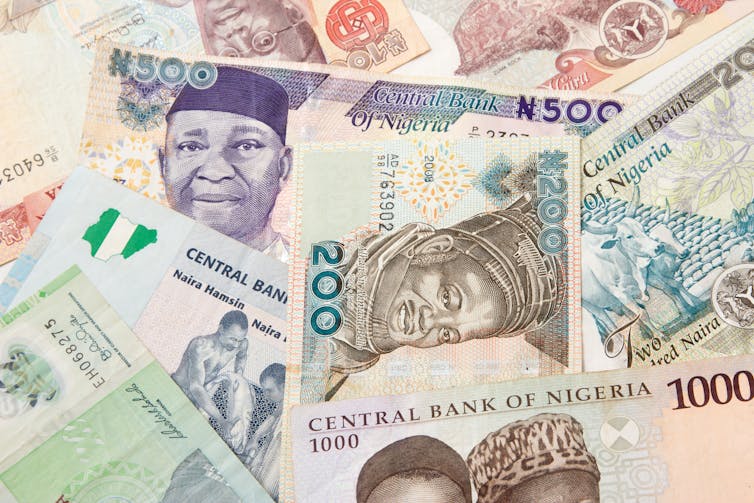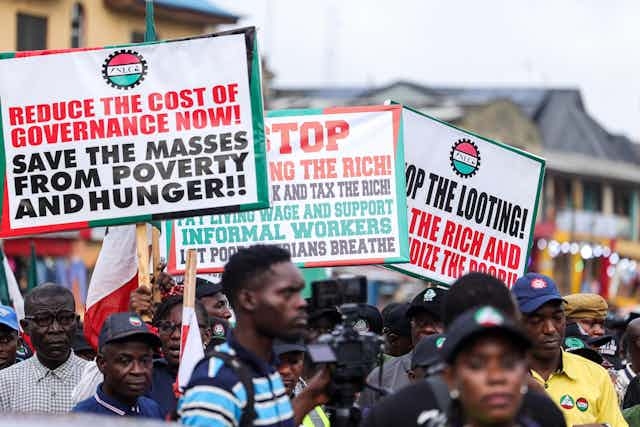Nigeria, Africa’s largest economy, is facing an economic crisis. From a botched currency redesign to the removal of fuel subsidies and a currency float, the nation has been plunged into spiralling inflation and a currency crisis with far-reaching consequences. The question now is: how long before the inferno consumes everything?
On October 26, 2022, the Central Bank of Nigeria announced a bold move – that it had redesigned the country’s highest denomination notes (₦200, ₦500 and ₦1000) and would be removing all old notes from circulation. People were given a deadline of January 31, 2023 (a couple of weeks before a national election) to make this exchange, or all of the old notes would cease to be valid legal tender.
This initiative ostensibly aimed to curb counterfeiting, encourage cashless transactions, and limit the buying of votes during the elections. But, while the intention may have been sound, the execution proved disastrous.
Short deadlines, limited availability of new notes, and inadequate communication created widespread panic. It led to long queues at banks, frustration among citizens, and a thriving black market for the new notes.
The confusion surrounding the currency redesign had an unintended consequence: the beginnings of a loss of confidence in the naira. People began to look to other mediums as a store of value and as a medium of exchange. The obvious choices were foreign currency like the US dollar and the British pound, as well as more stable cryptocurrencies like Tether’s USDT.
The currency redesign was criticised at the time by the then-presidential candidate of the ruling party, Bola Ahmed Tinubu, who saw it as a move to derail his presidential campaign. However, Tinubu won the contested election and, once in power, set out to reshape the economy immediately.
In his inaugural address in May 2023, Tinubu announced that the “fuel subsidy is gone”, referring to the government’s longstanding subsidised petrol policy that ensured Nigerians enjoyed some of the lowest petrol prices in the world. Over the coming days, he would also announce the reversal of the currency redesign policy and the floating of the Nigerian naira on the foreign exchange market.

Fuelling the flames
Other underlying economic conditions around the time of Tinubu’s inauguration included a large amount of foreign debt, dwindling foreign reserves and global economic headwinds. When the removal of the fuel subsidy was announced, it was met with a mix of surprise and elation by many Nigerians, and in particular by international donor agencies like the International Monetary Fund and the World Bank, who had long been advocating for the removal.
But this was all before the effects began to bite. And bite hard they did. The price of Premium Motor Spirit (also known as gasoline or petrol), which used to retail for ₦189 (US$0.12) per litre, increased by 196% practically overnight and began to retail for ₦557 per litre.
One challenge with developing economies like Nigeria is that a rise in fuel price tends to cause the price of everything else to rise. Many industries, particularly those in manufacturing and agriculture, tend to rely heavily on fuel for powering machinery and equipment due to the poor supply of grid electricity nationwide.
Many Nigerian households were significantly affected by the increased prices. But they saw an opportunity in that the savings from the fuel subsidy regime would be redistributed to improve education, healthcare provision and the general welfare of the people, as was promised during the electioneering. The regime cost the country an estimated ₦400 billion a month at its height, after all.
Enter currency devaluation
Then, on June 14, 2023, the Tinubu government ended the policy of pegging the naira to the US dollar, allowing it to float and find its true market value based on supply and demand. The idea was to stop corruption and reduce arbitrage opportunities due to the difference between official and black-market foreign exchange prices.
Currency arbitrage happens when people buy a currency at the lower official exchange rate and immediately sell it at the higher black market rate for a profit. This practice often occurs where there are strict currency controls and black markets offer a truer reflection of a currency’s value based on supply and demand.
However, this was one policy change too many. The naira lost a staggering 25% of its value in one day, and the cascading effects now push the country to the brink.
Nigeria depends heavily on imported commodities, including essential goods like food, fuel and medicine. So the policy escalated the inflationary crisis, pushing inflation to almost 30% (the major driver being food inflation, which reached 35.4%).
Imports in general have become significantly more expensive, and Nigerians are finding their purchasing power being eroded. Wages in Nigeria are pretty fixed. The current minimum wage in the country is ₦30,000 per month and the average monthly income is ₦71,185.
Businesses are also feeling the pinch, facing difficulties accessing the foreign exchange critical for importing raw materials and equipment.

Pheonix or ash?
The Central Bank of Nigeria has implemented measures to counter the crisis. It recently raised interest rates from 18.75% to 22.75% and is selling US dollars through auctions.
Recovery is a possibility and there are already signs of appreciation in the currency. The naira appreciated by 6.89% a day after interest rates were raised. But it will be a long, hard road.
These strategies often come with trade-offs. Higher interest rates can stifle already struggling economic growth, while currency interventions might deplete already strained reserves of foreign currency.
The bottom line is that if the current cost of living crisis continues, civil unrest is likely. Should this happen, who knows what – if anything – will be left behind when the flames are done.

